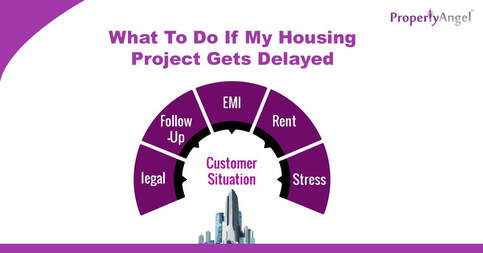|
Buying a home is not easy, especially in urban areas. A person spends all his savings on down payments and then takes out a hefty loan whose EMI he has to pay for the rest of his life if income doesn't increase as predicted. And what if the under construction property gets stalled or delayed? Nothing is more heartbreaking than this. So, in this blog, we will discuss how to deal with delayed housing projects and how to avoid them in the first place. Housing Project Delayed: What Do You Do?Usually, it's easier on the pocket for homebuyers to buy an under construction property and pay a pre-EMI. The Pre-EMI on a home loan is the interest paid to the lender while the property is still under construction. It doesn't adjust the loan that you've taken. However, when your project gets stalled, the first thing that strikes your mind is, what about the EMIs?. So, here are a few things a homebuyer can do in this scenario. Form an AssociationAs a buyer, the first thing you should do is to visit the under construction building and check who else is there. That's how you meet up with other homebuyers, communicate with them, and form an association to work on this issue. Search For Legal RecourseThe second step is to hire a law firm or lawyer with experience in property matters. Also, the lawyer should have both civil and criminal legal counsel because there can be a criminal case if your builder has misutilized the funds. Get an Injunction Ordering the Bank Not to Deduct Pre-EMIsThe Karnataka High Court has recognized that certain banks or financial institutions wrongfully disburse very large sums of money to construction projects, due to which these under construction buildings stop or don't move forward. As a result, banks cannot pressurize or take adverse action against such homebuyers and force them to pay pre-EMIs on projects that are still under construction, have been completely stalled, or have been delayed. Thus, homebuyers have the right to go to a civil court and get an injunction ordering the bank not to deduct the pre-EMI amount from them, or go to a high court as an association. Marketing Schemes and Gimmicks - Subvention SchemesIn short, a Subvention Scheme is a legal agreement between the buyer, the seller, and the financial institution providing the home loan. In this scheme, the buyer doesn't have to pay any interest until an agreed-upon period, which is mentioned under the contract terms. Although the central government scrapped this scheme in the 2019 budget, the builders have still continued to offer these schemes by making an agreement with the bank. Since the interest is borne by the bank and the customer doesn't pay it, the builders price their projects to include the finance costs into the price of their under construction buildings. Now, the builders advertise these schemes to attract buyers by claiming that these schemes are more financially secure when you buy an under construction property. Consequently, the builder, the financial institution, and the homebuyer enter into a tripartite agreement. In a tripartite agreement, it is agreed that the homebuyer has to pay a very small down payment (ranging from 5% to 20% of the loan amount), and the bank will fund the rest of the amount. When banks transfer these funds to developers, over which the homebuyers have no control, they end up diverting them to other construction projects. After a few years, the homebuyers realize that their project has stalled and nothing is moving forward. However, the homebuyer is still forced to pay the pre-EMIs, and he doesn't have the option to stop paying because his CIBIL score will suffer. And if he refuses to pay, the financial institution can take legal action against him by filing Section 138 or implement other legal remedies like sending recovery agents to his home. What Legal Steps Can You Take as A Homebuyer?File a RERA ComplaintThe RERA regulations have made builders far more cautious, and buyers can get multiple kinds of relief if they file a RERA complaint. For instance, under Section 18 of the Act, a buyer can seek complete refund as well as compensation if he wants to exit from the project. Also, under Section 8 of the Act, the association of homebuyers can appeal to transfer the project's construction to another builder if they want to continue. Plus, a buyer can seek interest for a delayed period. Although the execution of RERA orders is difficult, once a homebuyer gets a RERA order, it's important to understand that his debt is secured in many ways. If the homebuyer does end up in insolvency, this piece of paper will ensure that he is a financial creditor of that particular company and can seek his right before the NCLT (National Company Law Tribunal). File a Petition Before NCLT CourtNCLT is a great option available for homebuyers. For instance, when a group of homebuyers have formed an association, they are now recognized as "Financial Creditors" in the NCLT under the IPC code, which is the "Insolvency and Bankruptcy Code." Thus, homebuyers can collectively approach the NCLT and file for a Corporate Insolvency Resolution Process (CIRP). If the petition is accepted, the entire CIRP process starts where a resolution professional is appointed who specializes in handling distressed companies and distressed projects. File a Complaint in Consumer CourtConsumer Court is another excellent option for homebuyers. Because RERA and Consumer Court are parallel forums, a homebuyer can approach both, but he cannot ask for the same relief in both forums. For example, if a homebuyer asks for a refund in RERA, he cannot do the same in Consumer Court. However, he can ask for compensatory damages in Consumer Court. File a Criminal Complaint Against the Banks and BuildersHomebuyers can also file cases against the banks because they have released large sums of money without really considering the stages of construction, thus, violating the public trust doctrine that banks as financial institutions owe to the public. Plus, if the builder has misused the funds in any way, the homebuyers can also file a criminal case against the builder. What If Another Builder is Willing to Take Over the Under Construction PropertyEven with all of the legal remedies and knowing what the ground reality is, it's a very viable option for homebuyers to consider. It can take years to get a court order in your favour and execute the order. However, many homebuyers will refuse to go with a new builder, or the new builder will have a lot of terms and conditions for taking over your project, but it's all about balancing the options available. How Do You Avoid Falling into a Delayed Housing Project?Conduct a Thorough Background CheckA proper background check on the builder, the property, and the project itself is very important. It includes the financials of the project, the fund sources, the banks involved, etc. This research will also reveal whether the builder has a lot of financial constraints, whether he has the financial stability to finish the project, or whether the construction company has a lot of debt, and more. Thus, it will help a homebuyer decide whether or not to proceed with the project. Ensure that your Agreement is RegisteredAs a homebuyer, make sure your agreement is registered when you sign it. Many homebuyers confuse franking a document with registering. Franking is the process of getting the document stamped and indicates that the document is legal and the stamp duty has been paid. However, it doesn't ensure that your document is registered. A registered agreement is one that has been signed and scanned by the Government's Registrar office. A registered agreement has admissibility in a court of law, and it allows the homebuyer to transfer his rights if required. Ensure the Project Has Got All Necessary ApprovalsWhen buying an under construction property, make sure it's in a condition where the construction can take place without any interference. So ask the builder if they have received all necessary approvals to construct the project. Ideally, you should consult a lawyer when you plan to buy a property. The lawyer will ask you to get a list of documents from the builder, which you can ask from the builder and submit to the lawyer for verification. About Prop.AcademyProp.Academy is sponsored by PropertyAngel. Prop.Academy aims to inform and educate consumers about real estate affairs and upskill professionals on the latest tools and best practices.
In this video, Sapna Chandiramani, Co-founder of PropertyAngel, speaks with Advocate Ayusshi Agarwal, Founding Partner of Karya Associates, and Pawan Chadha, a distressed home buyer.
1 Comment
Hi I have read a lot from this blog thank you for sharing this information. We Provide all the services like Consumer Service, Real estate, Rental apartments, Property Management, Concierge Services, Apartment Listings, Real estate investment, and Residential Real Estate.
Reply
Leave a Reply. |
Archives
July 2024
Categories |


 RSS Feed
RSS Feed